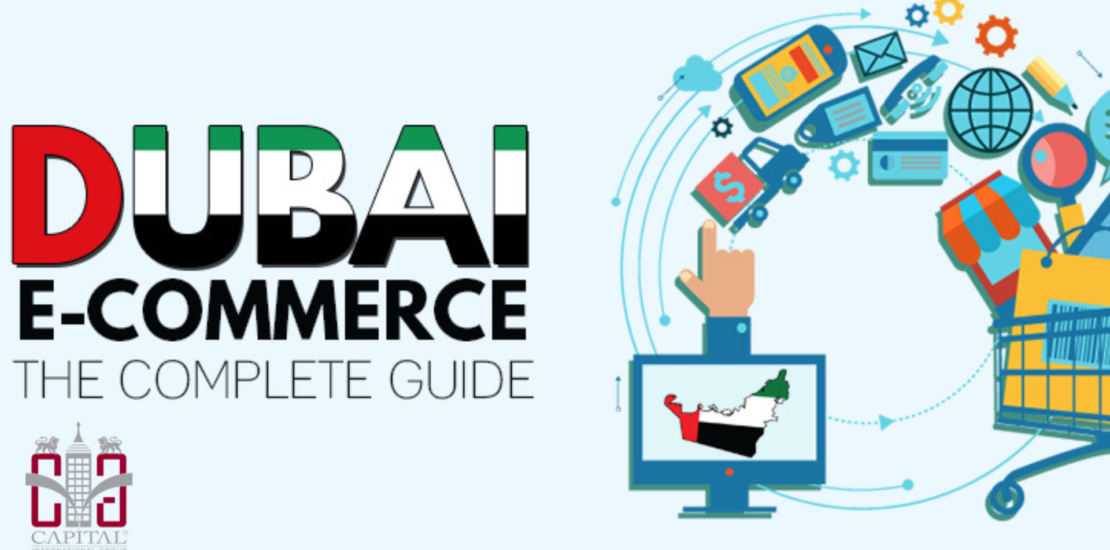- May 6, 2024
- Posted by: cigdubaiae
- Category: Uncategorized

Starting an E-commerce Business in Dubai, UAE: [A Step-by-Step Guide 2024]
Starting an E-commerce Business in Dubai, UAE: [A Step-by-Step Guide 2024]
Starting an E-commerce in UAE
The Covid-19 pandemic has triggered a swift evolution in global retail, mainly driven by the rise of e-commerce and changes in how people shop. As online shopping gains more traction, retailers are feeling the heat to adapt their methods to stay competitive and efficient. .
In 2024, the transaction value within the Digital Commerce market is estimated to hit US$18.44 billion. This figure is expected to experience a steady annual growth rate (CAGR 2024-2028) of 6.53%, leading to a projected total amount of US$23.75 billion by 2028. At Cig Dubai, we’re dedicated to helping you navigate any challenges or uncertainties you may encounter when starting an e-commerce business in Dubai, UAE. Feel free to reach out with any questions or concerns you have.
How to Get Started with an E-Commerce Company
-
Assess Market Demand:
Before diving in, it’s crucial to gauge if there’s a market for your product. This involves studying market trends, understanding customer preferences, and identifying your company’s unique value proposition (UVP). Depending on your target audience and market potential, you can opt for business models like B2B (Business-to-Business), B2C (Business-to-Consumer), or C2B (Consumer-to-Business) to best suit your company’s requirements.
-
Choosing the Right Location:
When starting an e-commerce business in Dubai, where you set up shop is crucial. Surprisingly, you don’t need a physical office in the United Arab Emirates. You have the option to apply for a business license either in a free zone or on the mainland. Operating from a Free Zone offers significant advantages: there are no personal income or corporate taxes, you can repatriate 100% of your business profits, and customs duties are minimal. To set up your business on the mainland, you’ll need to apply online through the Department of Economic Development (DED). This option allows you to engage in both domestic and international trade.
-
Obtain a Trade Name for Your Company
Registering a tradename in the United Arab Emirates is pretty straightforward. You just need to fill out a form from the Licensing Authorities and send it off to the government. But there’s a catch – your chosen name has to be in line with UAE regulations.
Ensure that your company name is free from offensive, religious, or controversial terms. Additionally, avoid using a name that closely resembles existing businesses in the UAE. If you’re naming the company after a person, make sure to include their full name.
-
Apply for an e-commerce business permit in UAE
Once you’ve identified a suitable location, it’s time to apply for your e-commerce license in the UAE. This license is obtained through the Department of Economic Development. Once you’ve identified a suitable location, it’s time to apply for your e-commerce license in the UAE. This license is obtained through the Department of Economic Development.
Having an e-commerce license in the UAE comes with several advantages. For instance, it grants you the freedom to operate your business across various social media platforms. If you hold a free zone license, you can collaborate with a local distributor. However, with a mainland license, you can engage directly with the local market, trading products and services without intermediaries.
-
Develop Your E-Commerce Website
Starting your e-commerce journey in Dubai, UAE demands a top-notch, easy-to-use, and secure website. Your online identity hinges on securing the right domain name. Luckily, there’s a plethora of user-friendly website builders out there to streamline the website creation process. With these platforms, coding expertise isn’t necessary to craft your website design.
-
Establish a Payment Gateway
To enable credit card transactions on your site, you’ll require a merchant account from a local bank or payment service provider. It’s vital to fine-tune your payment gateways for smooth traffic management, adhering to the Telecommunications Regulatory Authority (TRA) guidelines in the UAE, which regulate electronic transactions. Ensure your selected website builder provides round-the-clock customer support to troubleshoot any payment glitches promptly.
-
Support for Customers and Logistics
In the world of e-commerce, logistics and distribution are key players. It’s vital to manage your product inventory effectively, ensuring they’re readily available for sale and promptly delivered to customers. Customer support, technical operations, database management, and import-export capabilities are all crucial for your business’s success. You can either set up your own logistics operations in the UAE or opt for third-party logistics support.
-
Get your trade license
The UAE offers various e-commerce licenses, with Dubai alone providing three options. The type of license you require depends on your nationality and the nature of your business activities. If you plan to sell products online, you can obtain an E-trade license, which is for single ownership and doesn’t permit physical offices or shops. Non-UAE nationals have the option to obtain a Portal license, enabling them to establish an online business in the UAE by connecting buyers and sellers. Additionally, the DED has introduced a virtual company license, allowing overseas investors and non-UAE residents to conduct business in the region. For assistance in obtaining your e-commerce license, reach out to CigDubai, where licenses start at just AED 5500.
-
Get Import-Export Code(IEC)
To engage in exporting goods produced in the UAE, importing goods from foreign countries into the UAE, or re-exporting goods previously imported into the UAE, you’ll need an Import-Export Code (IEC) issued by the relevant customs department. The UAE offers a conducive environment for import and export, employing a unified customs approach across all Emirates. Once you have a valid trade license issued by the UAE licensing authority with the relevant trade activity, we can assist you in obtaining the UAE Import-Export Code (IEC).
What Makes Free Zones in the United Arab Emirates a Perfect E-commerce Ecosystem?
Entrepreneurs looking to launch an e-commerce business in the United Arab Emirates have a convenient option: the region’s Free Zones. These zones offer various cost-effective packages, with licenses starting at just AED 5500, making it easier for e-commerce companies to establish a foothold in the region. One major advantage of operating in a Free Zone is that you don’t need a No Objection Certificate (NOC) from a local sponsor.
Prominent Free Zones like Dubai Free Zone, Meydan Free Zone, Sharjah Media City (Shams), and Sharjah Research Technology and Innovation (SRTI) Park are drawing global investors seeking to start e-commerce businesses. At Cig Dubai, we specialize in expediting business setup in Free Zones. Contact us today to get started.
The Advantages of Obtaining a UAE E-commerce License
E-commerce offers numerous advantages, making it an appealing option for aspiring entrepreneurs worldwide. Some of these benefits include:
- Low initial investment with the potential for widespread reach.
- The ability to run your business entirely online, eliminating the need for a physical location.
- With a mainland license, you can establish a cost-effective branch office in the UAE.
- E-commerce is often one of the most cost-effective and popular business ventures.
- An e-commerce license removes the requirement for a traditional workplace.
- Shareholders are not obligated to have a physical presence.
- Free zone e-commerce licenses provide access to custom warehouse facilities.
- Import and export taxes are waived.
- E-commerce license holders can transact in multiple currencies.
- Increased flexibility is afforded by having an e-commerce license.
How Much Does It Cost in Dubai to Start an E-Commerce Business?
In Dubai, e-commerce license costs typically range from AED 5500 to AED 12500. However, the exact cost depends on several factors, such as:
- The type of license you choose (mainland or free zone).
- The size of your company.
- Your requirement for commercial office space and other amenities.
- The number of visas you apply for when obtaining the e-commerce license.
- The nature of your business operations.
Need Assistance?
The required documents and timelines vary between Emirates, and the chosen business setup location (Mainland, Free Zone, or Offshore) also influences the process. For detailed information on starting an e-commerce business in the UAE, feel free to reach out to us.
At Cig Dubai, we offer a comprehensive range of services, including business setup, feasibility studies, business plans, VAT compliance, accounting, audit services, legal consultation, corporate structuring, trademark registration, PRO services, bank account setup, nominee services, auditing, and legal affairs. With our extensive experience, we can help you navigate the complexities of business setup and avoid unnecessary delays.
For more information on starting your e-commerce business in Dubai, UAE please contact
📲 +971800244
📧 info@15.206.38.26
🌐 www.cigbusinesssetup.ae



